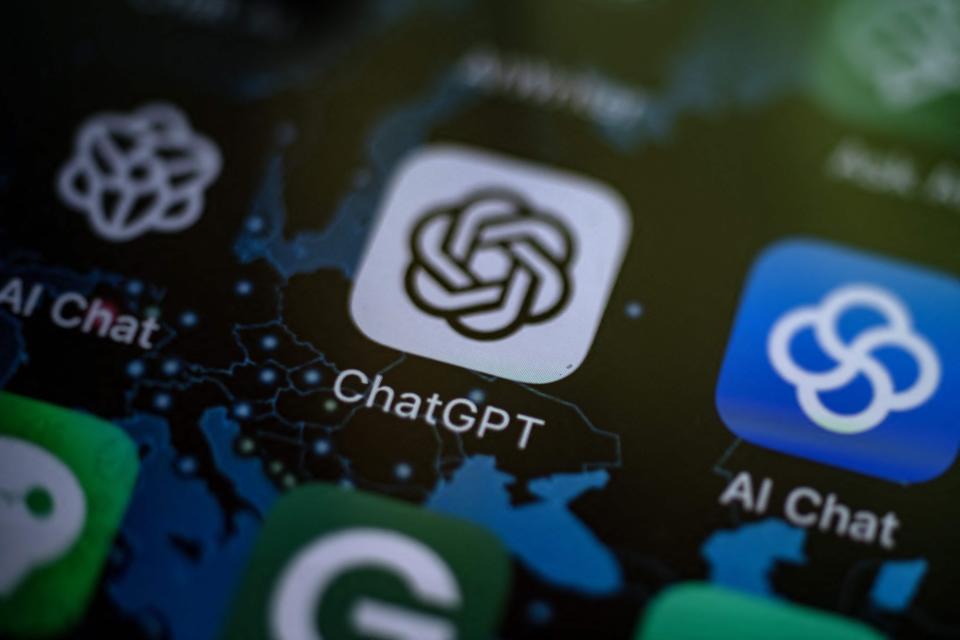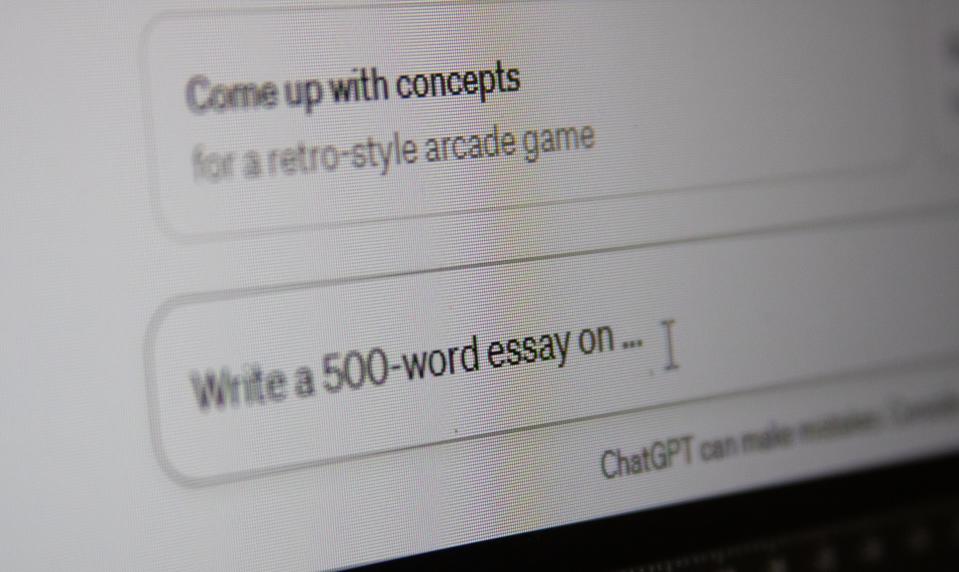Artificial intelligence: How are technology advances being used in Brevard classrooms?
In an era characterized by rapid technological advancements, students are increasingly finding themselves at the forefront of innovation, particularly in harnessing the potential of Artificial Intelligence (AI) to enhance their learning experiences. As educational paradigms continue to evolve, AI has emerged as a transformative tool, offering students an array of benefits that extend far beyond traditional classroom boundaries. From personalized learning pathways to real-time feedback mechanisms, the integration of AI technologies holds the promise of revolutionizing how students engage with educational content and cultivate essential skills for the future.
Or that's what ChatGPT says, anyway.
The chatbot, developed by OpenAI and launched in late 2022, is just one AI program that students around the world have taken advantage of. With a simple prompt, the bot will write paragraphs of text. But it's not always accurate, it can be overly flowery and pedantic to the point of tedium, and generally, it doesn't count as original work.
At this point, Brevard Public Schools doesn't have any policies related to the use of AI. But that doesn't mean students are allowed to use it — ChatGPT is blocked from students on district networks, and teachers are allowed to use AI only in some instances. It's a topic the district plans to address in the 2024-2025 student code of conduct and is continuously monitoring as AI continues to evolve.

While ChatGPT's popularity has thrust AI into the spotlight, artificial intelligence isn't new -- and for some students, it can make a huge impact in their learning.
Bethany Kulig's daughter was diagnosed with dyslexia in 2010. Her son received the same diagnosis soon after.
Kulig, who has a background in communication disorders and runs a tutoring company for children with language-related disabilities in Brevard, said AI programs have provided immense support for the kids she tutors.
Various programs can read text out loud, highlight text or manipulate it in other ways to make it easier to read, answer questions and more.
"This allows them to have access to text that they might not be able to decode yet, but (is) at their interest level," she said.
How prevalent is AI in Brevard classrooms?
Among a list of states, Florida ranked at No. 4 for how likely students are to use ChatGPT to cheat, according to a study from EssayPro. The study analyzed Google search volume over the past year related to AI tools for writing essays and ranked states according to the number of searches each month per one million residents. Florida had an average of 241.7 searches every month per one million people.
At Brevard Public Schools, the “intermittent access” to AI is allowed by staff, according to Robert Klassen, a technology integrator at BPS. They can use programs like Microsoft CoPilot assistant, which is powered by ChatGPT.
“Teachers and staff are allowed to use it but should not be entering any personally identifiable information for students or employees,” he said.
BPS currently does not have any policies related to the use of AI. However, they're set to adopt an updated student code of conduct for the 2024-2025 school year that includes the use of AI in the definition of plagiarism.
AI, hate offenses, more: Brevard Schools is creating the 2024-2025 student code of conduct. Here are the big changes
Brevard preps: Measles has spread to Central Florida. What preparations has Brevard made?
How are Brevard students using AI?
According to a 2023 survey of 1,023 high school students conducted by the Center for Democracy and Technology, about 58% of students have used generative AI. 72% of students “with an IEP or 504 plan have used generative AI,” according to the survey.
Teachers perceived a higher rate of the use of AI, according to the survey, with 90% of 1,005 middle and high school teachers surveyed reporting that they believed students had used generative AI for school.
While ChatGPT is blocked for student use, its ever-evolving nature makes it difficult to stay on top of, said Russell Bruhn, spokesperson for BPS.
“One of the aspects that makes this technology different from others is that it is designed to continuously learn and change,” he said. “This capability makes it difficult to ensure the protection and safety of the material presented to our students.”
How AI can help disabled students
While AI is typically viewed as a way for students to cheat, it could also be used to tutor or provide therapy to students with dyslexia, a learning disability that impacts approximately one in five Americans, according to Yale Center for Dyslexia and Creativity.
When Kulig's daughter was diagnosed with dyslexia in 2010, most AI programs didn't exist, she said.
"There was nothing," she said. "It took me forever to search and find even what reading program helps these kids, and technology just wasn't as advanced then."
But in the years since, AI has developed in a way that can help students with dyslexia and dysgraphia, a learning disability that impacts writing. These programs range from Amazon Alexa, which can read books aloud, to Google Read&Write, which can have a conversation with a user who may be struggling with what they are learning.
Using AI can help "level the playing field" for kids, she said.
"You've got a teacher who has 30 kids in the class, they can't spend all their time on remediation, especially if you've got 8th graders reading on the second grade level," Kulig said. "Let's give them access to speech-to-text or text-to-speech or all of these other things. Let them look up stuff, ask questions."
With a background in linguistics, Coral Hoh founded EduNational LLC in 2007, a company that served children with language difficulties and disorders. The company evolved into an AI firm with the launch of Dysolve in 2017, a program for dyslexia. The program identifies the source of students' difficulties and corrects them so a tutor isn't needed, Hoh said. It's a technique Hoh refers to as "AI-as-therapist."
"AI-as-tutor is compensatory, to help students cope with the difficulty," Hoh said, referring to programs that provide additional support to help students complete schoolwork. "AI-as-therapist is corrective, to get students out of that difficulty."
Kulig pointed out that AI can also address disabilities outside of dyslexia and dysgraphia, saying there's assistive technology that removed distracting items from pages, as well as AI that can provide image descriptions for people who are blind.
AI as a tool for Brevard teachers
One benefit of AI is that it can be helpful for teachers.
“The positive possibilities that AI presents for teachers in the classroom is vast,” Bruhn said. “Simple document creation to complex sample questions for students are some of the many possible uses of AI in the classroom.”
Klassen said AI can help teachers in many ways, from brainstorming new ideas to summarizing work.
“In our professional development sessions, we give examples of using it to help plan lessons, generate problem sets and create sample responses at different levels on a rubric,” he said.
“You can feed it an article and have it summarize the main points, or reduce the text complexity to make it more appropriate for the reading level of your students. It's also really fun to ask it to take on the persona of historical or literary figures and ‘interview’ them.”
He’s tried other scenarios, like creating “breakout room” style lessons. The technology isn’t perfect, but it provides a great jumping off point, he said. And it’s getting harder to avoid using.

“More and more web apps are also adding their own flavor of AI tools as well. I like to think of AI as an always-available collaborator," he said.
"You won’t always agree with it or use everything it suggests, but it can give you some great ideas and help you build on your own thoughts faster than you could by yourself.”
An imperfect system
Despite the ever-evolving things AI can do, it still has its limits. Klassen said the "No. 1 requested tool" from teachers is an AI detector to help prevent students from cheating. But those systems aren't perfect.
“There isn’t a viable option available," he said. "Most of the ones that claim to do this well still have issues."
At a March 5 board work session, changes to the student code of conduct were presented, including the added language related to plagiarism and AI. Chris Reed, director of student services, brought up the difficulties of trying to enforce a rule related to AI.
"We just really struggle with 'How are we going to know that that happened?'" he said. "We're just not sure how to enforce that, unless someone's bragging and posts that."
Board member Katye Campbell argued that having the language in the code of conduct was still important as the district works to navigates the evolving technology.
"To have the tool in the toolbox for as things move along, because the detection software is also growing … we already have it in place," she said.
Klassen said he hopes one day there's a way to allow students to use AI while keeping teachers in the know.
"My dream would be to have a product that enables us to unblock the sites for students, but alert and keep a history for teachers of how students are using them," he said.
Finch Walker is the education reporter at FLORIDA TODAY. Contact Walker at 321-290-4744 or fwalker@floridatoday.com. X: @_finchwalker.
This article originally appeared on Florida Today: No ChatGPT for Brevard students, but AI could be helpful for some

